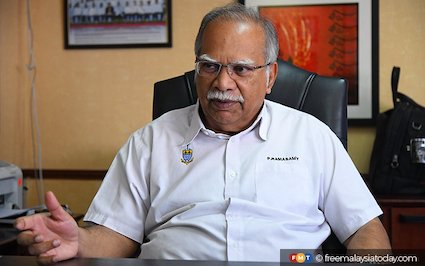Why did Pakatan not increase the minimum wage to RM2,000 when they were in power?

Since the 1990s, the opposition had been asking the government to set the minimum wage at RM1,200 a month. When they came to power in 2018, they did not do this. Now the opposition is complaining that the RM1,500 minimum wage is an insult.
NO HOLDS BARRED
Raja Petra Kamarudin
**********************************************************************
Ramasamy: “New minimum wage order a big let-down for country’s working class”
(Focus Malaysia) – Penang deputy chief minister II Dr P. Ramasamy has called the new minimum wage of RM1,500 a month a big let-down for the working class in the country.
He said that the amount “makes a mockery” of the galloping inflation, the hard work and sacrifice of nearly half of the country’s population and most importantly, is a gross injustice to the people.
“Yet the Government is going to town with the announcement as though the introduction of the new minimum wage might change the lives of workers overnight for the better,” he remarked.
“Some quarters have questioned the point of introducing a pittance called ‘minimum wage’ as it would be insufficient to boldly address the welfare and wellbeing of workers.”
Ramasamy’s comment came following the announcement that Malaysia’s new minimum wage of RM1,500 has been officially gazetted and will take effect nationwide on May 1.
The Minimum Wages Order 2022 made by Human Resources Minister Datuk Seri M. Saravanan means that the minimum wage that employers must pay workers would amount to RM7.21 per hours.
In daily wages this translates to RM57.69 for a six-day work week; RM69.23 (five-day work week); and RM86.54 (four-day work week).
“Even if the Government has approved the official minimum wage by ostensibly taking into account positions of unions, workers and the employers, the minimum wage is not really a compromise as the Government would want us to believe,” Ramasamy noted.
“It is actually aimed at cushioning employers against the worst effect of the recent economic slowdown and to insulate them from labour agitation
“It makes no sense for the Government to come up with a minimum wage of RM1,500 which is considered a pittance for the years of labour sacrifice and the general rise in productivity.
“Of course, even this particular minimum wage is not welcomed by some sections of employers who are bent on squeezing labour to the maximum.”
Weak workers’ unions
Ramasamy went on to criticise the weak state of workers’ unions in the country, noting that if unions are strong and vigorous there would be no need for the minimum wage as the matter could be negotiated in the interest of workers in the country.
“Government intervention on matters like wages is predicated on the notion that the employers or unions should not be left to themselves as the latter might have the numbers to their advantage,” he pointed out.
“But unfortunately, the Government takes a lead in introducing the minimum wage because the unions are weak and their leaders or dealers have become accustomed to the culture of compromise to the extent that the rights of their members have been sacrificed.”
Ramasamy further took a swipe at labour representatives whom – apart from the occasional press statements – were silent on the matter of minimum wage.
“In the earlier period of independence labour representatives were at the forefront of workers’ agitation and struggles but such a scenario is missing these days as unionists are more comfortable seeking compromises with the Government and employers,” he said.
Need for wage flexibility
Ramasamy further questioned the point of getting the US and the International Labour Organisation (ILO) to assist the country in eliminating forced labour when minimum wage, among others, “lays the condition for the perpetuation of forced or unfree labour”.
He noted that there is a need for wage flexibility where employers and unions can determine the basis of market forces of supply and demand.
“What is the point of introducing a miserable and shameful minimum wage when conditions are not in favour of workers to make demands to employers?” he asked.
“Why is the minimum wage used to depress the bargaining power of workers post-COVID-19 pandemic?”

